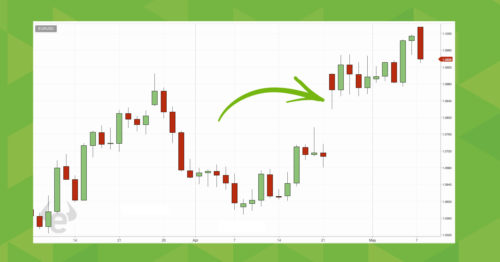The much anticipated Presidential election in France has come to a close and Emmanuel Macron is the clear victor. After receiving more than 65% of the vote, the 39-year-old independent candidate was declared winner, defeating far-right nationalist Marine Le Pen. Macron’s victory is perceived as a stabilizing factor for the EU, as apparent by how markets reacted to his victory. But how will the new president shape France and the EU’s economy?
The market’s’ initial reaction to Macron’s win was a positive one. While the gains seen in the Euro and leading indices in Europe were not as impressive as the ones that followed the results of the first round at the end of last month, they were still indicative of a similar positive vibe. As Macron was declared winner, the Euro reached a six-month high against the US Dollar and the FTSE, DAX and CAC all started the next day with impressive gains.

A sigh of relief for the EU
It’s been a tough year for the European Union. After being rattled by several years of financial instability, relating to the debt of the weaker economies in the Union, a staggering blow was dealt last June, when the people of Britain voted in favor of the Brexit. During Marine Le Pen’s campaign, it became quite clear that if she wins, she will champion a similar referendum in France. When early polls held before the first round showed she had a small lead, some were already beginning to practice the word “Frexit.”
However, after Macron got the most votes in the first round, and polls predicted a landslide victory for him in the second, the EU was starting to show signs of optimism, with various financial assets registering impressive gains. With Macron’s victory, the threat of France leaving the EU has been lifted, and a sense of stability restored. Moreover, Macron, who served as Minister of the Economy, is a strong supporter of the EU and has said that he will take measures to strengthen his country’s ties and influence within the Union.
A period of growth for France?
Internally, Macron’s plans for the French economy are seen as a rejuvenating factor for the EU’s second-largest economy. While his rival Le Pen’s campaign made populistic promises such as locking-in the 35-hour workweek and keeping retirement age at 60, Macron will try to renegotiate both factors. While some of France’s citizens might oppose this change, from a macroeconomic standpoint, extending work hours and raising the retirement age could be beneficial for the country’s economy.
Macron’s stance on immigration is also completely opposite of Le Pen’s. The new president is pro-immigration and wishes to maintain the current state of free-movement within the EU for member-countries’ nationals. Keeping France’s position as a nexus of free-flowing labor is also seen by many as a factor which will contribute to the Union’s economic stability.
Challenges still ahead
Despite the extremely positive vibe felt around the world, the burden of proof now lies on the shoulders of the relatively inexperienced President. Macron still has to appoint a Prime Minister and might face hardship when the legislative elections take place in June. As opposed to his clear victory in the Presidential race, the division is much greater in Parliament, and he could struggle to get a majority in the legislative branch. In addition, his challenges now include navigating the stormy waters of the EU, taking part in the Brexit process and cooperating with US President Donald Trump.
Currently, the atmosphere surrounding Macron’s win is one of relief. Despite his young age and little political experience, he is perceived by many as the bringer of stability to the EU. Global markets have shown their faith in France’s youngest-ever President – but now he has to get to work and show his voters and supporters around the world that he can continue this momentum, and bring growth to France and the EU.




